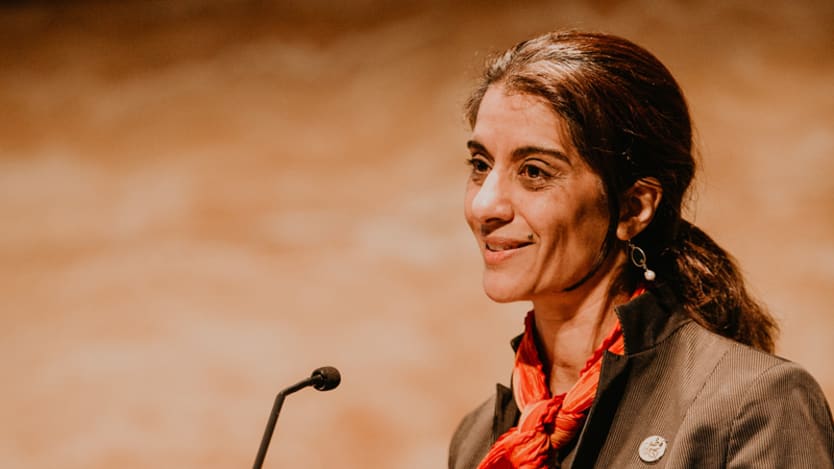
CANBERRA — Supporting peacekeeping is at the core of the International Civil Society Action Network, or ICAN, which builds networks at the local level to engage both sides of a conflict. ICAN’s peacemakers understand local customs and issues, but they put their lives at risk to do the work. And these peacemakers are women.
“There's no point in going and telling a man that women's rights are important.”
— Sanam Naraghi-Anderlini, executive director, ICANAt the Australian Council for International Development annual conference in Sydney, Australia, earlier this month, ICAN Executive Director Sanam Naraghi-Anderlini spoke to Devex about why women are critical to the peace process, and how they can be better supported in breaking down barriers.
Creative solutions
ICAN — which Naraghi-Anderlini calls a “curated network” — helps to identify and bring together women working on the ground to achieve peace. The challenges they face may be unique to their circumstances. But bringing these women together, Naraghi-Anderlini said, helps build creative solutions.
“How do you work with the police? … How do you work with legislators? These women teach each other and it’s fascinating to see simple tactics that they might use,” she said.
More on peace and security:
► The concept of women, peace, and security is changing: But is government evolving with it?
In building peace within countries and communities, the way the issues are discussed needs to be localized and jargon removed. Through these networks, women can discuss what works best in communicating why it is important to listen to women and to think about how they are impacted.
“There's no point in going and telling a man that women's rights are important,” Naraghi-Anderlini said. “First of all, the terminology gets mistranslated along the way. But if you ask whether daughters should go to school, whether daughters should be safe when they are married, and what Islam says about treating girls, you can open up conversation. In each context, it's going to be slightly different and nuanced. But if you start here, you can get on to the other issues and challenges that exist and build solutions for peace.”
Three levels of support
Curating a network of women peacemakers is not enough: Support is required “on three levels,” Naraghi-Anderlini explained. “It's personal support, professional support, and institutional support.”
Personal support creates an understanding that the type of work these women are doing is dangerous, and not something easily shared with family.
“Especially if negotiating with rebels,” Naraghi-Anderlini said. “This is dangerous work. But it’s important to have a network to share thoughts and challenges with other women in similar circumstances. So what we've [been doing] is providing through WhatsApp, online and in-person opportunities where our partners can just talk to each other. If a bomb goes off in Tunisia, for example, we can reach out to our Tunisian colleague so that they know they are not alone in the world.”
ICAN provides the second level, professional support, by creating and opening opportunities for female negotiators to advocate at international organizations, conferences, and in meetings with donors and policymakers.
“If we know of a meeting, we can facilitate the introduction between the parties,” Naraghi-Anderlini said. “And then we also have a lot of partners who are interested in fellowships or [whom] we may support in being nominated for prizes to expand their presence.”
For institutional support, ICAN provides women with resources, funding, and tools to help advocate and achieve change.
“We do a lot of animations, and that helps in [putting] the issues in a form that is accessible and understandable,” Naraghi-Anderlini said. “But the funding is very important. What we hear from donors is that they'd like to fund local organizations, but can't handle a $20,000 grant or know who to support.”
ICAN also takes on the role of parceling out funds it receives from a larger pool, and can support women in their network to put together funding proposals.
The challenges for women peacemakers
“Sometimes it's not safe to talk about stuff,” Naraghi-Anderlini said. “But it doesn't mean that on the ground, certain efforts [aren’t] being made. Women are keeping the spaces open for discussion, or trying to maintain communication channels.”
“When push comes to shove, when things get bad, the first people that are warning us and standing up are women.”
—For many women peacemakers, their work is invisible and behind the scenes. If they are engaging with terrorists to stop a conflict, this is not something that can be promoted. The invisibility of the work is a challenge. But equally, modern terrorism laws mean that some women could be implicated by association.
“Those laws need to be revised and addressed as well, because we're stuck on the inside. But this is a new reality, so by highlighting it, we hope it can lead to discussion and change that can support our peacemakers,” said Naraghi-Anderlini.
What is more of a challenge is how little is being done on conflict prevention. Peacemaking is commonly reactive.
ICAN has been developed to be flexible, allowing partners to adjust their work and push back or forward as required against the impact of politics, growing nationalism or movements against women’s rights. An important aspect of the network is to ensure that women are given a voice, a function that NGOs globally can support.
“When push comes to shove, when things get bad, the first people that are warning us and standing up are women. And if we listen to them, and if we support them in the work that they're doing and adopt their ideas before the crisis, maybe they could stop it,” Naraghi-Anderlini said.








